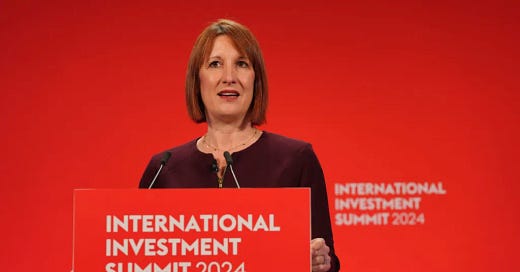The Great British Growth Delusion: Why We Need to Stop Pretending
Can we make the brave trade offs to deliver difficult things like economic growth and more homes?
The recent piece by Janan Ganesh in the Financial Times on Britain's growth delusion set out the big challenges we face when talking about economic growth. It accurately captures the frustrating reality: we talk a big game about economic growth, but our actions rarely reflect this ambition. We are a nation of contradictions, constantly prioritizing short term goals over the long term prosperity we claim to be aiming for. This "fudge," as the article aptly puts it, leaves us with sluggish growth and a lack of clear direction.
One example of this is the housing crisis. We desperately need more homes to accommodate our growing population, boost economic activity, and improve living standards but local communities resist development projects, even those that could deliver affordable housing. Green belt restrictions and a complex planning system make the problem worse. We want affordable housing, but resist the very developments that could deliver it. This isn't a uniquely British problem, but our indecision is particularly acute.
This growth delusion has three key forms:
The Not That Much Syndrome: We want growth, but not only if it can be delivered without the risk of any negative impacts, we want growth but not so much it might cause even the smallest negative consequences. These "not that much" caveats constantly undermine any serious attempt at boosting economic dynamism.
The Growth Strategy Illusion: There is endless talk about the need for a "growth strategy," but this often amounts to little more than wish lists and vague pronouncements. An effective growth strategy requires difficult choices, a willingness to prioritize economic objectives, and a long-term vision.
The Everyone Wins Fallacy: We cling to the notion that economic growth can be achieved without any trade-offs. Progress often requires disruption, and some interests will inevitably be impacted.
The question we have to ask is: Are we truly committed to a higher growth trajectory, or are we content with a more modest but easier to achieve ambition ?
In response to this question we should look at what the government can do to foster genuine growth?
Embrace difficult choices: If the government wants to prioritise economic growth it needs to be willing to make the necessary trade-offs. This may involve decisions such as streamlining planning processes which will inevitably lead to some compalints.
Foster a culture of innovation: Encourage risk taking and entrepreneurship through tax incentives, less complex regulation and increased investment in research and development.
Invest in infrastructure: Modernise transport networks, improve digital connectivity, and upgrade energy infrastructure to support a growing and increasingly digital economy.
Reform the education and training system: Equip the workforce with the skills needed to thrive in a rapidly changing economy. This includes promoting lifelong learning and addressing skills shortages.
The path to sustained economic growth is not easy. It requires a long-term vision, a willingness to make difficult choices, and a consistent commitment to reform. It's time to have an honest conversation about priorities. Are we as a country actually serious about economic growth or are there other priorities? The answer will determine all our futures.




